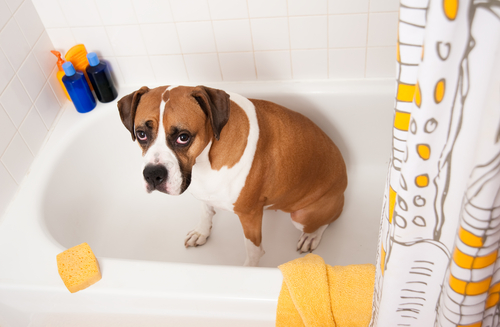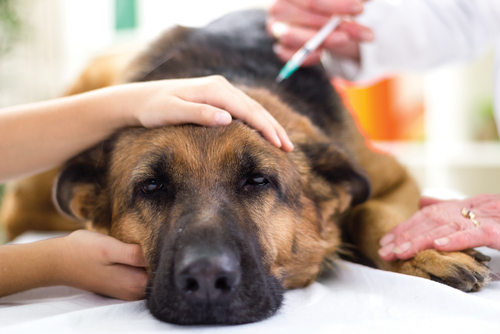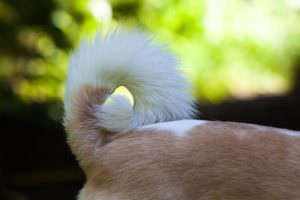I hear this question frequently and sometimes I am the one that notices the odor myself when the dog and owner are enclosed in my exam room. Sometimes I catch a whiff of my own dog from the back seat of my Jeep. Everyone that has dogs knows that occasionally there are… well, odors.
Not all smells are abnormal. When I was in college, I dated a guy who told me that he had adopted a Labrador Retriever because they are the only breed of dog that has no odor, but realistically speaking, all dogs have some scent. Dogs depend on smells for much of their communication so it is expected that they will have personal odors, whether we can detect them or not. Some breeds in my experience are more pungent naturally, especially if they are heavy coated. These aromas are normal for dogs.

Behavior
Sometimes dogs smell bad because of behaviors that they engage in. They may encounter a skunk or find something smelly to roll in. If they dig up old chew bones and chew on them, they may smell foul for a time, but these normal behavioral associated stinks are usually transient. In these cases, sometimes they just need a good bath. Some people say that dogs are trying to cover up their own scent by engaging in these stinky habits, but I think it may be similar to why they eat grass (See Why Does My Dog Eat Grass). Some things are just fun to do.
There are also odors that are not normal, so if you notice a new and foul odor from your dog, you need to investigate.
Health
Health issues tend to cause persistent odors. Some examples of medical related odors include: ear infections, skin disease, anal gland disease, dental disease and urinary tract issues.

A dog with a skin infection will typically show more signs of problems than just a bad all-over odor, but sometimes the smell is the first sign. A dog with allergic disease and secondary skin infection will have a distinctive, almost sweet (but repugnant) odor from the oils in his skin becoming rancid from bacterial action. You might notice thinning hair, flaking skin and redness/itching in addition to odor. Skin infections will require a veterinarian to prescribe medications to address the primary issue and many times secondary issues also. Itchy infected skin is no picnic, so seek help.
Dogs with allergic skin disease will often have infected ears too. We forget that ears are lined with skin and if the allergy is causing skin irritation, the ears may be inflamed as well. Inflamed ears are susceptible to secondary otitis from yeast and other agents. A common abnormal ear odor reminds me of dirty socks and ear infections are very painful. Normal ears don’t stink, so you will need a vet for this one too.
Canines have small secretory glands on either side of their rectum. These glands are called anal sacs and these secrete a fluid that dogs use to identify themselves to one another (This is why they sniff butts). Even normal anal sacs or glands sometimes secrete a foul fishy smelling liquid, but normal expression is supposed to occur when the dog defecates. So if your dog smells like fish all the time, something is wrong. Infected anal glands can also rupture and drain pus. If you notice that your dog stinks and is scooting his rear on the floor with or without licking himself frequently, you need veterinary help. The area around the anal sacs has lots of nerves and this problem is very uncomfortable for affected dogs.

We joke about dog breath, but there is a distinct difference between a normal mouth and an infected one. If your dog is panting near you and you have to turn your head, it is not normal. Any veterinary professional can easily assess your dog for dental disease and make suggestions to improve it. Dental infection odors do not typically wax and wane. They will be persistent smells that come from the mouth. Each time your dog swallows when he has dental disease, he could be showering his internal organs with bacteria and periodontal disease is very painful.
Some dogs with recurrent urinary infections or urine leaking will have a bad odor associated with the smell and moisture of the urine. The odor might be apparently a urine smell or it might be a different type of offensive stench that is only recognizable as “bad”. You might notice urine that has a similar smells on rugs or in his bed. You will need medical help for these types of odors because recurrent urinary tract disease is not normal and must be appropriately diagnosed and treated or it could become life-threatening.
If your dog stinks and it does not go away or returns shortly after bathing, health reasons must be considered. Try to localize the source of the odor, whether it is front end (mouth or ears), back end (anal glands or urinary tract) or an all over smell (skin). Your veterinarian can advise you on ways to address the smell and make sure that your dog is not suffering from a health condition.
